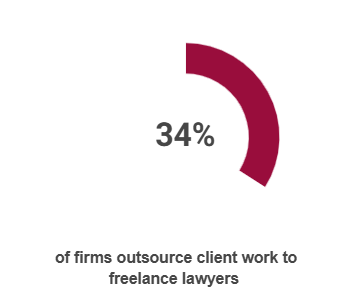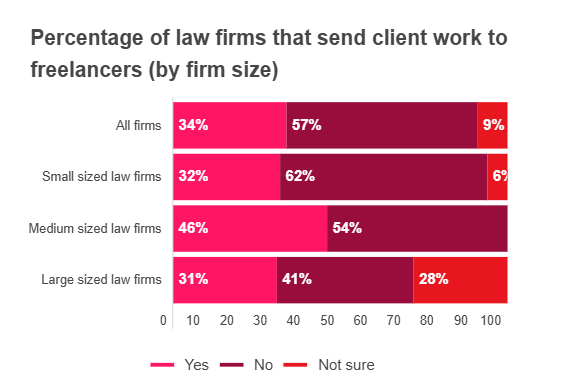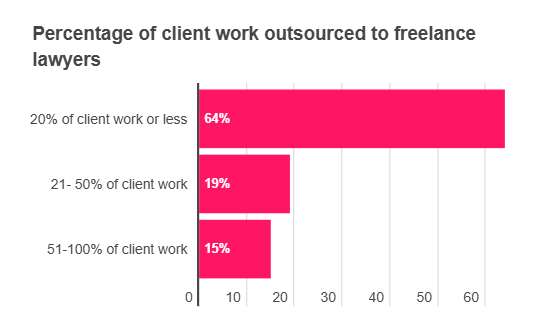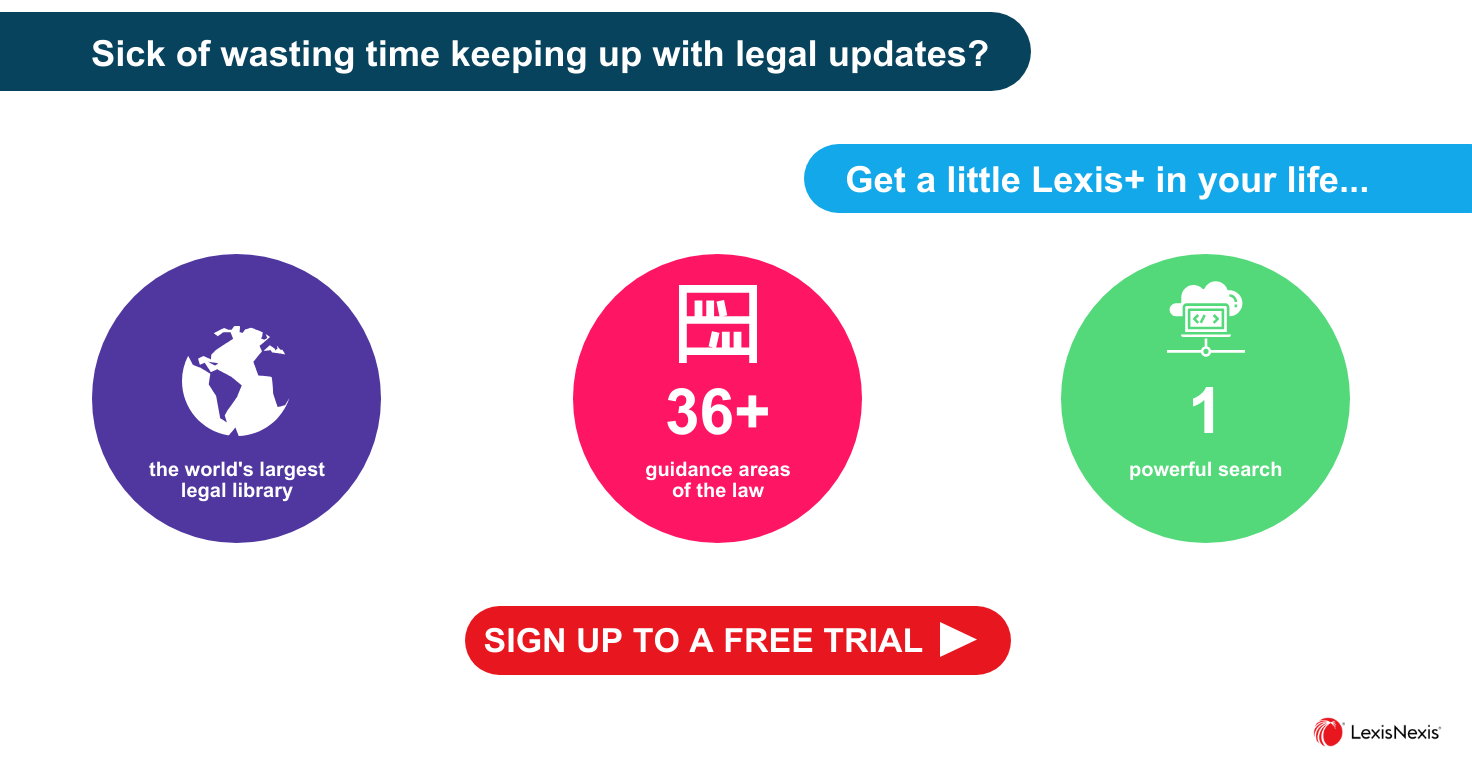Law firms' hush-hush relationship with freelancers
Outsourcing client work is something many firms do, yet very few talk about.

Calculating the perfect number of lawyers needed to deliver client work, exactly when it's required, and across all the many niches of the law – it's as much an art as it is a science.
It's little wonder why a growing number of firms are relying on freelance lawyers to keep up with the peaks and troughs.
Yet the topic of outsourcing is somewhat taboo in legal circles.
LexisNexis investigates how much client work law firms are outsourcing to freelancers, the pros and cons of doing so, and where firms should draw a line in the sand.
Different types of legal freelancers
Just how much work do law firms send to freelancers?

A recent LexisNexis survey of law firm leaders found more than a third (34%) rely on short-term contract or freelance lawyers to carry out client work. More than half of (57%) said they're not using freelancers, while one-tenth (9%) said they're not sure.
Interestingly, medium-sized firms were the most likely to employ freelancers, with almost half (46%) doing so. Understandably, leaders at larger firms were more likely to say they did not know the specific arrangements their departments had with freelancers (28%).
"You can increase or decrease resources a lot quicker than you can a permanent workforce," says John Joyce, the Former Managing Partner at Addleshaw Goddard.
Joyce says Addleshaw Goddard might dip into the freelance market to temporarily increase capacity, but it would never be part of their long-term strategy to fill the demand you expect to have.
"The margin you make in doing so is a lot less, because you've got to pay the freelancers a contract rate rather than an employed rate," he says.
Deborah Finkler, the Managing Partner of Slaughter and May, says they occasionally use high-grade contract lawyers as an additional resource in areas which are particularly busy.
"Freelance lawyers are there to do a very specific role, like document review, and work alongside, not as a substitute for, our permanent workforce."
Of the firms that do work with freelance lawyers, the majority (64%) rely on them to deliver one-fifth of client work or less.
Interestingly, 15% of the law firms that use freelancers do so for more than half of their client work, and 7% said freelancers complete 90-100% of all client work.
This shows a small but noticeable number of firms rely significantly on freelancers to carry out the majority of their client work.
"Freelance lawyers are there to do a very specific role, like document review, and work alongside, not as a substitute for, our permanent workforce."
Deborah Finkler
Managing Partner, Slaughter and May

Yet firms should also be weary of outsourcing too much client work to freelancers, as it could impact growth.
According to a McKinsey study of 2,000 companies, firms wanting to grow need to establish a “one-team approach” by adopting a highly-collaborative, cross-functional, team-oriented culture. Not only will this help with retention, companies with a “one-team approach” are 2.3 times more likely to be in the top quartile of high performers, the study found.
This, of course, is incredibly difficult to do if your workforce is temporary.
What type of work are firms giving to freelancers?

One of the most obvious use cases for taking on a freelance lawyer is getting access to specialist knowledge, says Joyce from Addleshaw Goddard.
"If a client wants an expert in something quite niche, say submarine cable laying law, you can hire an expert on a short-term contract basis for that specific task. That means you're not permanently employing someone that's waiting around for more work to come in."
These knowledge specialists can be found individually, through fee-sharing firms, or on secondment from flexible legal resourcing providers such as Lawyers on Demand.
However, Joyce also added: "We don't feel we need to deliver everything that anyone's ever going to ask us to do on any given day."
"That might mean you're carrying less resource than you need one week, while you're carrying more the next week."
Outsourcing legal work only works for certain areas of the law. John Quinn, the Co-founder and Chairman of Quinn Emanuel Urquhart & Sullivan, says this approach to resourcing wouldn't work in trial litigation.
"For lawyers to contribute to the sizeable matters we work on at our firm, we really need them to be working with us on a day-in-day-out, full-time basis."
James Knight, the CEO of fee-sharing firm, Keystone Law, says the short-term contractor model only really works for the “low-level, factory type law in the consumer space”.
Knight's firm, which started in the early 2000s and is now one of the UK's largest of its kind, has an expansive team of legal consultants that find their own contacts to work directly with clients. They also take home most of their fee-earnings.
"We don't feel we need to deliver everything that anyone's ever going to ask us to do on any given day."
"That might mean you're carrying less resource than you need one week, while you're carrying more the next week."
John Joyce
Former Managing Partner, Addleshaw Goddard

Another factor firms have to consider when looking to optimise their outsourcing strategy is the impact of generative AI.
More and more lawyers are turning to AI to increase their efficiency and effectiveness. A little over a quarter (26%) of lawyers and legal professionals are currently using generative AI tools at least once a month, according to a January 2024 LexisNexis survey of more than 1,200 legal professionals in the UK. This is a noticeable rise from only 11% of respondents in July 2023.
In the future, lawyers will use generative AI for everything from legal research, to drafting legal documents, to document analysis, and much more.
This could mean, with the help of generative AI tools, that firms have less of a need for freelance lawyers to carry out simpler tasks or access niche areas of the law.
Much like hiring in a freelancer, Lexis+ AI can increase revenue. In our survey, we also asked associates how their firms can make more money, and the top response was to invest more in technology that increases efficiency (48%), and to invest in innovative products (31%).
Yet only 28% of associates said they're working with technology, innovation or data science teams on a regular basis. This jumped up to 36% when looking at associates from large law firms, yet almost twice that number said they have little or no interaction with these teams, or that they don't yet exist.
As firms continue to invest in generative AI, we will no doubt see more cross-departmental collaboration, but clearly there is more that can be done to increase efficiency and effectiveness of firms' permanently employed workforce.
Are more lawyers becoming freelancers?

In today's competitive market, attracting and retaining legal talent is a top challenge for firms of all sizes.
Moira Slape, the Chief People Officer at Travers Smith, believes the pandemic caused a shift in mindset for associates at law firms.
"Their 'psychological contract' with their employer can differ when it comes to the investment of time they are prepared to commit to building their career."
Corporate social responsibility—CSR—regulatory requirements
Their list of demands are lengthy, says Slape. Alongside compensation and work-life balance, this generation also want honesty around their firm's commitment to diversity and inclusion (D&I), a business strategy which is clear and compelling, excellent training, and for their voices to be heard.
As a result, the appeal of going freelance is stronger than ever.
Fee-sharing firms like Keystone Law and gunnercooke have attracted a significant number of solicitors from all different stages of their careers – and research predicts even more lawyers will flock to them in the years to come.
Keystone Law also has an impressive employee retention rate. Hundreds of self-employed legal consultants are on the firm's books and they stay for an average of 12 years.
"We compete with the mid-tier conventional law firm, but enable our lawyers to work with a greater degree of flexibility and autonomy which helps with their job satisfaction and our retention," says Knight.
Fee-sharing firms allow legal consultants to take home the lion's share of the profit. A big part of the appeal is also the flexibility, says gunnercooke's Co-Founder and Executive Chairman, Darryl Cooke.
“We don’t have the bureaucracy, we don’t have the politics, we don’t have the remuneration battles, we don’t have the hourly billing targets, so we take away all the things that people don’t like about big law and give them total freedom. If they don’t want to work Fridays, they don’t work Fridays, if they want to take six weeks off in the summer, they take six weeks off in the summer.”
Read our investigative report: Rise of the legal consultants
Contract-based firms such as Lawyers On Demand have also attracted significant volumes of highly experienced freelance lawyers on their books.
Many of the solicitors we spoke with as part of our research said they would be open to working freelance.
"Firms seem happy to take on lawyers like this. I would prefer less stress and perhaps less reward for a better work-life balance," said a family law solicitor.
Another solicitor said: "Working freelance is definitely appealing. My firm's owner actually said he'd be better off financially working freelance."
Final thoughts
Outsourcing can clearly help with busy bursts of client work. But to grow – or even to remain competitive – firms will need to build highly-unified, digitally-driven teams that work together to deliver exceptional legal work at a faster pace than ever before.

Methodology

The survey was conducted across 588 lawyers legal leaders and associates in the United Kingdom from 03 January to 19 January, 2024. Surveys were conducted in English.








